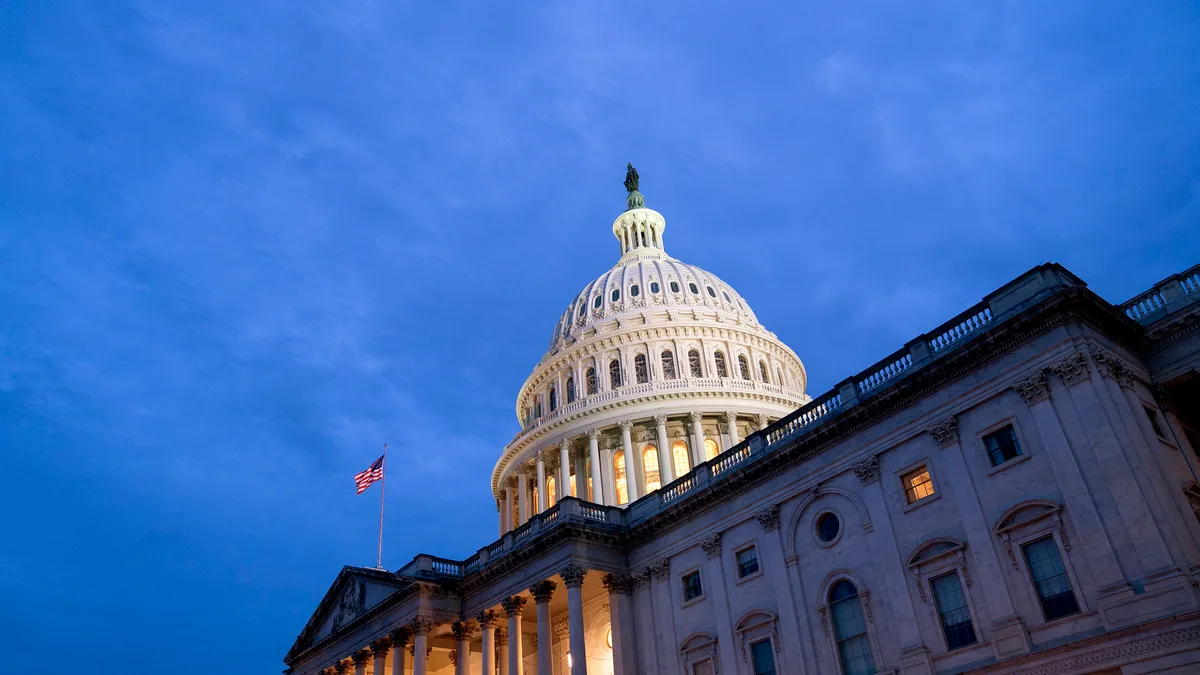Dive Brief:
-
The American Bankers Association (ABA) warned lawmakers of the "real world trade-offs" that would come with the launch of a central bank digital currency (CBDC), ahead of a Senate Banking Committee hearing set for Wednesday.
-
"The proposed benefits of CBDCs to international competitiveness and financial inclusion are theoretical, difficult to measure, and may be elusive, while the negative consequences for monetary policy, financial stability, financial intermediation, the payments system, and the customers and communities that banks serve could be severe," the group wrote in its letter to members of the committee.
-
Wednesday’s hearing comes as the Federal Reserve has indicated public and congressional input will be necessary before action on a CBDC is taken. The Boston Fed, which is working alongside Massachusetts Institute of Technology (MIT) researchers to develop software that would move, store and settle transactions with digital dollars, has also said it could unveil some of their work as early as next month.
Dive Insight:
"[A]fter a careful review of the benefits and risks of various proposals to implement a CBDC, it does not appear that a CBDC is well-positioned to enhance underlying financial capabilities or extend the reach of financial services in well-developed markets, at least not in the U.S. context, despite the overly optimistic promises from proponents," the trade group wrote.
The heightened global interest in CBDCs is instilling a sense of urgency in some lawmakers and think tanks who fear the U.S. is at risk of being dethroned as the globe’s financial leader if it doesn’t move on CBDCs fast enough.
"We cannot be left behind," Senate Banking Committee Chairman Sherrod Brown, D-OH, wrote to Powell in May, urging him to accelerate the research into a CBDC.
Powell, for his part last month, said the Fed will issue a paper this summer designed to “stimulate broad conversation” about a CBDC.
“While various structures and technologies might be used, a CBDC could be designed for use by the general public,” Powell said in a brief video and statement posted on the Fed’s website. “Our key focus is on whether and how a CBDC could improve on an already safe, effective, dynamic and efficient U.S. domestic payments system.”
Powell added that the Fed believes “it is important that any potential CBDC could serve as a complement to, and not a replacement of, cash and current private-sector digital forms of the dollar, such as deposits at commercial banks.”
China, which has been researching a digital yuan since 2014 and has launched pilot projects across the country, plans to showcase its progress by allowing foreign athletes and visitors to use the digital currency during the Beijing Winter Olympics next year, according to CNBC.
Several other countries, including Sweden and the U.K., are also exploring CBDCs, and the European Central Bank said it plans to release an analysis on CBDCs this summer.
But, like fellow bank trade group the Bank Policy Institute (BPI), the ABA warned policymakers should not be swayed by international peer pressure and should proceed with "extreme caution" when it comes to the digital coin.
The ABA argued the U.S. already has a "well-developed and robust financial system in place," and should not implement a CBDC simply because others are doing so.
The group said it supports the Federal Reserve’s "thoughtful and considered approach" and said the forthcoming Boston Fed findings will be an important next step for understanding the feasibility of CBDCs.
The group also called for the Federal Reserve to publish a risks and benefits analysis with input from the U.S. Treasury and other banking regulators before a CBDC is introduced.
"Given the additional complexity, delay, and transition costs involved in creating a new form of money, there are strong efficiency interests that suggest CBDC should only be pursued as a final option to meet clearly-defined public policy goals that cannot be achieved through payments innovations that leverage existing digital dollars," the group wrote. "As of today, those use cases have not emerged. If a viable use case for CBDC in the United States does emerge in the future, design choices must be carefully considered to ensure that the benefits as well as the risks of introducing a CBDC are fully appreciated."














